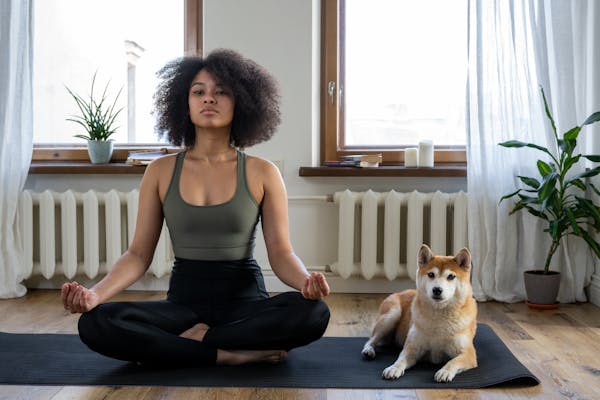Top 10 Beginner-Friendly Yoga Poses
Outlines:
Introduction to Yoga for Beginners
Importance of yoga for beginners
Benefits of starting yoga practice
Preparing for Yoga Sessions
Finding the right space
Necessary equipment and attire
Top 10 Beginner-Friendly Yoga Poses
Mountain Pose (Tadasana)
Downward-Facing Dog (Adho Mukha Svanasana)
Child's Pose (Balasana)
Warrior I (Virabhadrasana I)
Warrior II (Virabhadrasana II)
Tree Pose (Vrksasana)
Cat-Cow Pose (Marjaryasana-Bitilasana)
Cobra Pose (Bhujangasana)
Bridge Pose (Setu Bandhasana)
Corpse Pose (Savasana)
Step-by-Step Guide for Each Pose
Proper form and technique
Benefits of each pose
Modifications for beginners
Tips for a Successful Yoga Practice
Breathing techniques (Pranayama)
Importance of consistency and patience
Listening to your body
How Yoga Poses Benefit Mind and Body
Stress relief and relaxation
Flexibility and strength improvement
Mental clarity and focus enhancement
Conclusion
Recap of beginner-friendly poses and their benefits
Encouragement for starting a yoga journey
Yoga serves as an incredible gateway to physical and mental well-being, especially for beginners. Delving into this ancient practice can seem daunting initially, but with the right guidance and beginner-friendly poses, anyone can embrace the transformative power of yoga. Here, we present a comprehensive guide to the top 10 beginner-friendly yoga poses that pave the way for a fulfilling yoga journey.
Mountain Pose (Tadasana)
Among the foundational yoga poses, the Mountain Pose stands tall. It's a simple yet powerful posture that focuses on alignment, grounding, and mindful breathing. Start by standing tall with feet grounded, arms by your sides, and attention on your breath.
Downward-Facing Dog (Adho Mukha Svanasana)
A staple in most yoga practices, the Downward-Facing Dog is excellent for stretching the entire body. It involves forming an inverted V-shape, with hands and feet grounded, providing a deep stretch for the back, hamstrings, and shoulders.
Child's Pose (Balasana)
Restorative and calming, the Child's Pose is a resting posture that aids in relaxation. Kneel on the mat, sitting back on your heels, then fold forward with arms extended or relaxed by your sides, allowing the body to release tension.
Warrior I (Virabhadrasana I) & Warrior II (Virabhadrasana II)
Warrior poses embody strength and stability. Warrior I involves standing tall with one foot forward, knee bent, and arms extended overhead. Warrior II extends the posture with arms stretched out parallel to the floor, enhancing balance and focus.
Tree Pose (Vrksasana)
The Tree Pose is ideal for improving balance and concentration. Stand on one foot, placing the sole against the inner thigh or calf of the opposite leg, with hands at the heart center or raised overhead, resembling the grace and steadiness of a tree.
Cat-Cow Pose (Marjaryasana-Bitilasana)
A gentle flow between arching and rounding the spine, the Cat-Cow Pose promotes spinal flexibility and relaxation. Move between the two poses, syncing breath with movement to enhance spinal health.
Cobra Pose (Bhujangasana)
Revitalize your spine with the Cobra Pose. Lie face-down, palms beneath the shoulders, lift the chest while keeping the lower body grounded. This pose strengthens the back and opens the heart, promoting flexibility.
Bridge Pose (Setu Bandhasana)
Bridge Pose targets the back, glutes, and hamstrings. Lie on your back, bend the knees, and lift the hips toward the ceiling, interlacing fingers beneath the back, creating a bridge-like shape, fostering strength and stability.
Corpse Pose (Savasana)
A pose of complete relaxation and rejuvenation, Corpse Pose involves lying flat on your back, arms at your sides, and allowing the body to melt into the ground. It's an essential closing posture for every yoga session.
Conclusion
Embarking on a yoga journey as a beginner can be immensely rewarding. The top 10 beginner-friendly yoga poses not only introduce foundational postures but also lay the groundwork for a fulfilling practice. With patience, dedication, and these poses' gentle guidance, anyone can experience the holistic benefits of yoga.
FAQs
Is yoga suitable for beginners with limited flexibility?
Yoga caters to individuals of all levels, offering modifications to accommodate various abilities and flexibility levels. Beginners can start with simpler versions of poses and gradually progress.
How frequently should beginners practice yoga?
Consistency matters more than frequency for beginners. Starting with a few sessions per week allows the body to adapt gradually.
Are there any specific breathing techniques beginners should focus on?
Yes, beginners can begin with simple breathing exercises like deep belly breathing or the 4-7-8 technique to establish a foundation for mindful breathing during yoga practice.
Should beginners be concerned about not being able to hold a pose for long?
Absolutely not. Yoga isn't about perfection but progress. Beginners can hold poses for shorter durations and gradually increase as they build strength and flexibility.
Can yoga help with stress and anxiety for beginners?
Yes, yoga's combination of movement, breathwork, and meditation can significantly reduce stress and anxiety, promoting relaxation and mental well-being.
